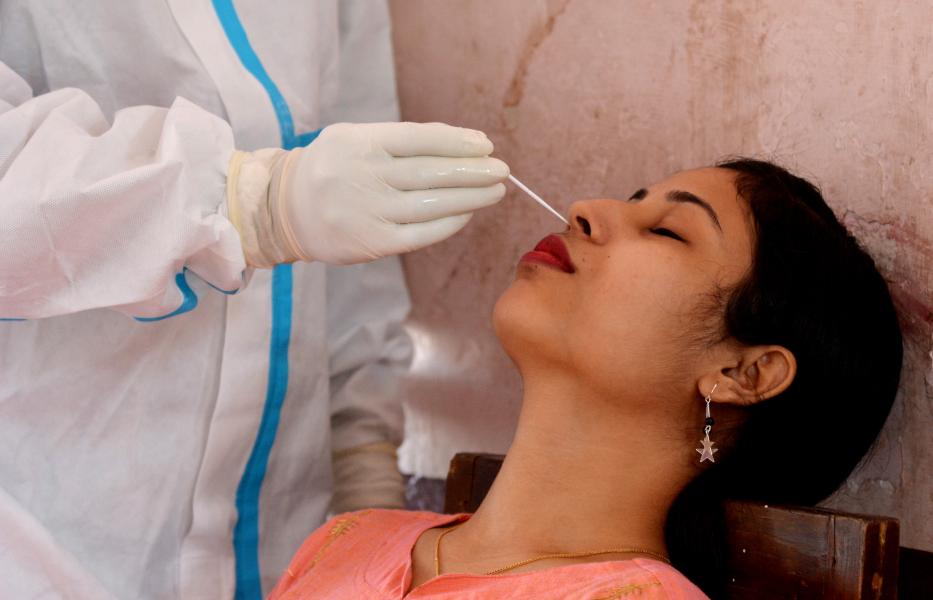-The United States by Friday has registered the most infections -- close to 10 million and a fifth of the world's total, and deaths at over 230,000.
-From Europe to the Asia-Pacific, Middle East and Africa, lockdowns have been re-imposed in cities, with updated health protocols and fundraising events held to help tackle the pandemic in Africa.
-Countries should fight as one in face of COVID-19.
BEIJING, Nov. 7 (Xinhua) -- It has been nearly a year since the onset of the COVID-19 outbreak, with the world witnessing soaring daily cases of over 400,000 for half a month.
While many countries are striving to flatten the curve through strict controls and a scientific attitude, others are mired in skyrocketing cases and deaths due to politicizing and downplaying the pandemic.
Facing such a dire situation, the international community needs to pull together and take a persistent, substantial and science-based approach to end the pandemic.
HARDEST-HIT
Global COVID-19 infections topped 49 million on Friday, an increase of 10 million cases in roughly 20 days, according to data by Johns Hopkins University.

People wearing face masks play chess at Bryant Park in New York, the United States, Nov. 6, 2020. (Xinhua/Wang Ying)
The United States by Friday has registered the most infections -- close to 10 million and a fifth of the world's total, and deaths at over 230,000.
Overshadowed by yet another grim estimate, a recent study by the University of Washington showed that the coronavirus death toll in the U.S. would reach just shy of 400,000 by Feb. 1.
The worsening situation, said Anthony Fauci, director of the U.S. National Institute of Allergy and Infectious Diseases, has been caused in particular by the "divisiveness" of different U.S. states in following health recommendations, such as wearing masks.
"If everyone had done that uniformly, I don't think we would be in the position we're in right now," the U.S. top infectious expert said, adding that "people were ridiculed for wearing masks. It depended on which side of a political spectrum you were at."
U.S. President Donald Trump, who had said the country was doing "very well" in handling the pandemic, tested positive himself for COVID-19 on Oct. 1.
The virus has also rampaged through high-ranking U.S. officials, including White House Chief of Staff Mark Meadows, the president's top aide Stephen Miller, Republican Senators Thom Tillis, Mike Lee and Ron Johnson, as well as top military officials.
While withdrawing from the World Health Organization (WHO) and playing a game of blame-shifting, the Trump administration has been criticized for its handling of the health emergency.
The U.S. move is a "strategic mistake," which is "dangerous, irresponsible, immoral and self-defeating," and an attempt to blame its failure in handling COVID-19 on the WHO and China, said Wilson Lee Flores, a columnist with The Philippine Star.

A health worker collects swab from a woman for a COVID-19 test at Paltan Bazar in Guwahati, India's Assam State, Sept. 28, 2020. (Str/Xinhua)
India is the second hardest-hit in the world, with 8,462,080 total cases and 125,562 deaths as of Friday. Brazil, ranking third in terms of case tally with 5,631,181 cases, has the second-highest death toll at 162,015.
Experts warned that the pandemic impact on India's rural communities "could be catastrophic," given "the lack of rural health infrastructure," according to Business Insider.
"Brazil is a cautionary tale," Albert Ko, a professor at the Yale School of Public Health with decades of experience in Brazil, was quoted by Reuters as saying. "The epidemic hit hard and many evidence-based interventions were not implemented or done properly in many places."
SECOND WAVE
After global infection numbers appeared to have slowed earlier this year, a second wave of new cases began to sweep across the world, with countries resorting to urgent restrictive measures such as lockdowns, mass testing and curfews.
In China, despite smaller-scale clusters of cases discovered in Beijing, Xinjiang and Dalian in recent months, the lives of those residing in China have essentially returned to normal amid regular COVID-19 control and prevention measures.
Addressing a September meeting in Beijing to commend those on the frontlines of the epidemic fight, Chinese President Xi Jinping said China has been heroic in humanity's fight against the disease.

A man wearing a face mask walks past a recently painted mural of a nurse in Manchester, Britain, Nov. 5, 2020. (Photo by Jon Super/Xinhua)
As the northern hemisphere is entering winter, the COVID-19 numbers are surging in many European countries including Spain, France, Britain, Italy, Germany, the Netherlands, Belgium and the Czech Republic, which have broken their daily records during the peak of the pandemic earlier in the year.
In addition to Trump, some leaders and senior officials in other countries have also contracted COVID-19 or entered self-quarantine after being in contact with infected persons.
British Prime Minister Boris Johnson was the first major world leader confirmed to have COVID-19 after he tested positive in March. On Oct. 5, European Commission President Ursula von der Leyen said she had decided to self-isolate for a second time after contact with a COVID-19 patient despite negative test results. Earlier this week, Cambodian leaders and officials entered a 14-day quarantine after Hungarian Minister of Foreign Affairs and Trade Peter Szijjarto, who recently wrapped up a visit to the country, tested positive for coronavirus.
From Europe to the Asia-Pacific, Middle East and Africa, lockdowns have been re-imposed in cities, with updated health protocols and fundraising events held to help tackle the pandemic in Africa.
Britain on Thursday imposed a month-long lockdown in England until Dec. 2, the second toughest set of social curbs since the start of the pandemic, and South Korea has announced new five-tier social-distancing regulations, covering mandatory mask-wearing, limited social gatherings and the shutdown of facilities.
Iran has announced an extension of restrictive measures to 71 cities until Nov. 14, including the shutdown of major educational and cultural activities, and in mid-October, the African Union Commission hosted a fundraising event that envisaged to raise 300 million U.S. dollars through the AU COVID-19 Response Fund to help tackle the effects of COVID-19 in Africa.

Shops in Galleria Vittorio Emanuele II are closed according to the latest decree in Milan, Italy, Nov. 6, 2020. (Photo by Alberto Lingria/Xinhua)
Calling a nationwide lockdown as a necessity to curb the surge of coronavirus, Liverpool-based and global public health expert Professor John Ashton, who has worked with the WHO, said "we need to regain control, just like they did in Wuhan, and across China," referring to the Chinese government's decisive restrictions to curb the spread of the virus in the central Chinese city.
Sharing similar views, Tobias Adrian, financial counselor and director of the IMF's Monetary and Capital Markets Department, said that "the rest of the world can learn from China because China has been very effective in fighting the pandemic" and some of its methods "in terms of tracing the spread of the virus and containing spreading are really exemplary."
THE FUTURE
In early October, delegates attending the annual debate of the Third Committee of the United Nations General Assembly (UNGA) called for "renewed solidarity" in addressing the fallout of the COVID-19 pandemic, stressing the fundamental role of the WHO.
Countries should fight as one in face of COVID-19, said Zhong Nanshan, a renowned respiratory professor from China's Guangzhou Medical University, urging for more medical cooperation at a Chinese-Qatari video conference on experience and expertise in fighting the pandemic.
The idea was echoed by Von der Leyen, who called recently for people to look after their health "through global health cooperation, not through global health competition" amid the dramatic spike in coronavirus cases.

Members of the Chinese medical expert team communicate with local frontline health workers at a COVID-19 testing facility in Juba, South Sudan, Aug. 21, 2020. (Chinese Embassy in South Sudan/Handout via Xinhua)
As an advocator of multilateral cooperation, China has joined COVAX, a global initiative backed by the WHO to ensure effective and equitable global access to COVID-19 vaccines, and pledged that when available, its vaccine will be shared with other countries as a global public good.
Furthermore, by providing emergency medical supplies to countries and international organizations worldwide since the outbreak, dispatching medical expert teams and sharing experiences in combating COVID-19 with multiple countries, China is doing its part to build a community with a shared future for mankind and a community of health for all.
In a video speech at the UN high-level meetings in September, Chinese President Xi called on countries to put people and lives first and enhance solidarity to get through the pandemic together.
"COVID-19 will not be the last crisis to confront humanity, so we must join hands and be prepared to meet even more global challenges," Xi said.

A staff member walks past the booth of French pharmaceutical company Sanofi at the special area for public health and epidemic prevention of the 3rd China International Import Expo (CIIE) in Shanghai, east China, Nov. 5, 2020. (Xinhua/Zhang Yuwei)
On the economic front, China, according to an IMF estimate in October, is expected to record economic growth of 1.9 percent in 2020, emerging as the only major economy in the world that can inch back into positive territory this year.
By hosting the third China International Import Expo (CIIE), which has attracted up to 70 percent of the world's top 500 companies that participated in the first two expos, China has demonstrated its sincere desire to share its market opportunities with the world and contribute to global economic recovery.
Experts and scholars said holding such a large-scale event as the CIIE has fully demonstrated China's economic recovery and also highlights the significance of closer cooperation in international trade.
"Our aim is to turn the Chinese market into a market for the world, a market shared by all, and a market accessible to all," Xi said. "This way, we will be able to bring more positive energy to the global community." (Video reporters: Du Yang, Ren Ke, Zhang Yirong, Zhang Yuan, Zhao Yuchao; Video editor: Zhao Xiaoqing.)



